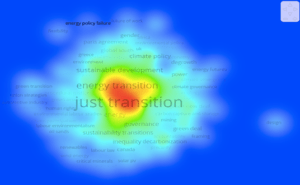… a silver bullet for climate justice or a political playbook for climate denial?
- Bitter lessons from the smokescreens of big tobacco
It is arguable that fumes aside the fight to mainstream the harm from smoking tobacco is similar to the ensuing conversations around energy transition. If you admonished the public in the early 1950s to give up a loosie on the grounds that ‘smoking causes cancer’, you would be standing trial for blowing nuisance alarms. Try it on a smoker, and you might walk away with a cigarette burn. While the science at the time was conclusive on the causative relationship between smoking and cancer deaths, the smoker and the general populace were skeptical and blamelessly so.
The science conflicted with the commercial interests of the tobacco industry, stirring what would become the grandest, most successful public deception campaigns in public health: a big tobacco conspiracy that leveraged junk science and PR to portray smoking as harmless. Eventually, the science won, and in May 2003, the World Health Assembly adopted the WHO Framework Convention on Tobacco Control (WHO FCTC).
When you see bolded, stern warnings such as ‘smoking kills’ on the labels of shiny cigarette packs, it is a WHO FCTC dictate in action. Perhaps too little, too late an effort? Today, some 1 billion people are still hooked to the pipe, nearly 80 percent of whom live in low and middle-income regions; 8 million of these smokers die yearly. Clearly, the cost of pseudoscience, denial and delay tactics in the face of scientific evidence is fatal!
Good news! Big oil is not big tobacco!
Like the tobacco economy, the fossil economy is a public health and an existential threat, with substantial commercial stakes. Like big tobacco, the truest political and economic powers rest within big oil to phase out crude. Like tobacco, fossil fuel finds final battlegrounds in Africa.
The stark difference, though, is that there is perhaps no denial – less so by Big Oil – of the catastrophic effects of Greenhouse Gases (close to 75 percent of which is contributed by fossil fuels). Through the Paris Agreement, there is a global consensus to limit global warming to below 2 degrees compared to the pre-industrial era, with energy transition at the heart of achieving this goal. So, it seems the stage is otherwise set for this dire seismic shift. But towards what? At what pace? And by whom? These and other questions have kept the transition agenda off the runway, and so the dream of an autopilot from fossil fuels to renewable energy has been served with varied cautionary notes, I believe for a good reason. The new catchphrase in this caution is ‘Just Transition’. Even though the phrase ‘Just Transition’ dates back to the 1980s, its usage in relation to the energy transition gained traction within the past three years. For instance, more than 80 percent of the 749 most cited articles, book chapters, short surveys, editorials, notes and conference papers on just transition over the past 36 years were published between 2020 and 2022.
There is an Upsurge of Published Literature Containing the Keyword ‘Just Transition’ Over the Past Three Years.

Source: Author’s construct Based on Scopus Database
In the earliest transition lexicon (circa the 1980s), ‘Just Transition’ was used by US labour unions to advocate for alternative jobs and economic inclusion for workers affected by new water and air pollution regulations. In the energy transition context, the International Labour Organisation defines ‘Just Transition’ as
“Greening the economy in a way that is as fair and inclusive as possible to everyone concerned, creating decent work opportunities and leaving no one behind.”
Thus, in general, ‘Just Transition’ connotes the idea that environmental justice can be achieved congruently with job security. The phrase, however, risks degenerating into a political playbook for putting energy transition on the back burner. This risk is particularly rife in Africa, where the last ‘dance’ between fossil fuels and renewable energy is expected to play out. Here is the AU-led Common Position on Energy Access and Just Transition:
“Africa will continue to deploy all forms of its abundant energy resources, including renewable and nonrenewable energy, to address energy demand. Natural gas, green and low carbon hydrogen and nuclear energy will therefore be expected to play a crucial role in expanding modern energy access in the short to medium term while enhancing the uptake of renewables in the long term for low carbon and climate-resilient trajectory.”
This position confirms assertions by Just Transition Research Collaborative on the evolution of ‘Just Transition’ “from a simple claim for jobs creation in the green economy, to a radical critique of capitalism and refusal of market solutions”, and by extension an implicit resolve to stick with old technology.
What should a just transition framework address?
A reformist, forward-thinking approach to a just transition must address the urgency of climate emergency, and position Africa to actively participate in the transition economy, for instance, by leveraging the beneficiation opportunities in critical minerals for job creation. However, this cannot be achieved without a candid dialogue on and remedy for energy policy failure. Experts maintain that Renewable Energy (RE) policy implementation failure is the main barrier to renewable energy penetration in Ghana, with a non-implementation status of 80 percent.
The real losers of this perpetual energy policy failure are households that would otherwise have access to safer alternatives to wood fuel, and remote communities that would have had access to cheaper decentralised RE power for their businesses. To the extent that RE policy failure results from political hesitancy, it constitutes an injustice. So, the arc of the just transition must ultimately bend towards renewable energy and a commitment to follow through on RE policy objectives.
A review of the keywords in the most cited, Scopus-indexed publications on ‘Just Transition’ reveals that the literature is rather faint on the actionable keywords, i.e. critical minerals, climate emergency, and energy policy failure, that should be key to reframing the just transition. Rather, the literature is replete with buzzwords such as ‘just transition’, energy transition, sustainable development, energy access, global south, inequality, climate policy, governance, power and carbon capture and storage, which reflects the inclination of the discussions towards less aggressive climate actions and the sustenance of existing energy systems to address access gaps. Other lesser occurring keywords include gender, green transition, renewables, and Paris agreement.
The Just Transition Literature is Replete with Buzzwords and Faint on Actionable Keywords

Source: Author’s construct, built with VOSviewer
In the final analysis, the energy transition is a revolutionary boat on sail into a new era that no country can afford to miss. Thus, Africa has two pathways towards bridging its energy access gap: outdated technologies that the world would eventually shift away from or climate-resilient energy sources that leverage, of which she is much endowed with. In 2010 (or so), when the Africa Development Bank, the Brookings Institution, and the United Nations University came together to diagnose Africa’s failure to industrialise, they concluded that Africa missed the industrialisation boat mainly due to ‘bad luck’ and ‘policy failure’. In the context of the energy transition, Africa is on the lucky side of history; by virtue of her critical mineral and renewable energy resource endowment, and unique opportunity to take advantage of changing global investment patterns to attract climate financing for green industrialisation. But the risk of [renewable] energy policy failure persists, arguably driven by political hesitancy.
If this is not addressed, when analysts convene to discuss Africa and the energy transition in the next 50 years, I fear it would be another depressing discourse about how Africa was slow to act when luck was on its side.
This article is a revised version of an earlier article by the same author, originally published on the website of the Africa Centre for Energy Policy (ACEP) on January 2022. The views and opinions expressed in this article are the author’s and do not reflect the position of ACEP.
The writer is a policy analyst at the African Centre for Energy Poliy (ACEP).










